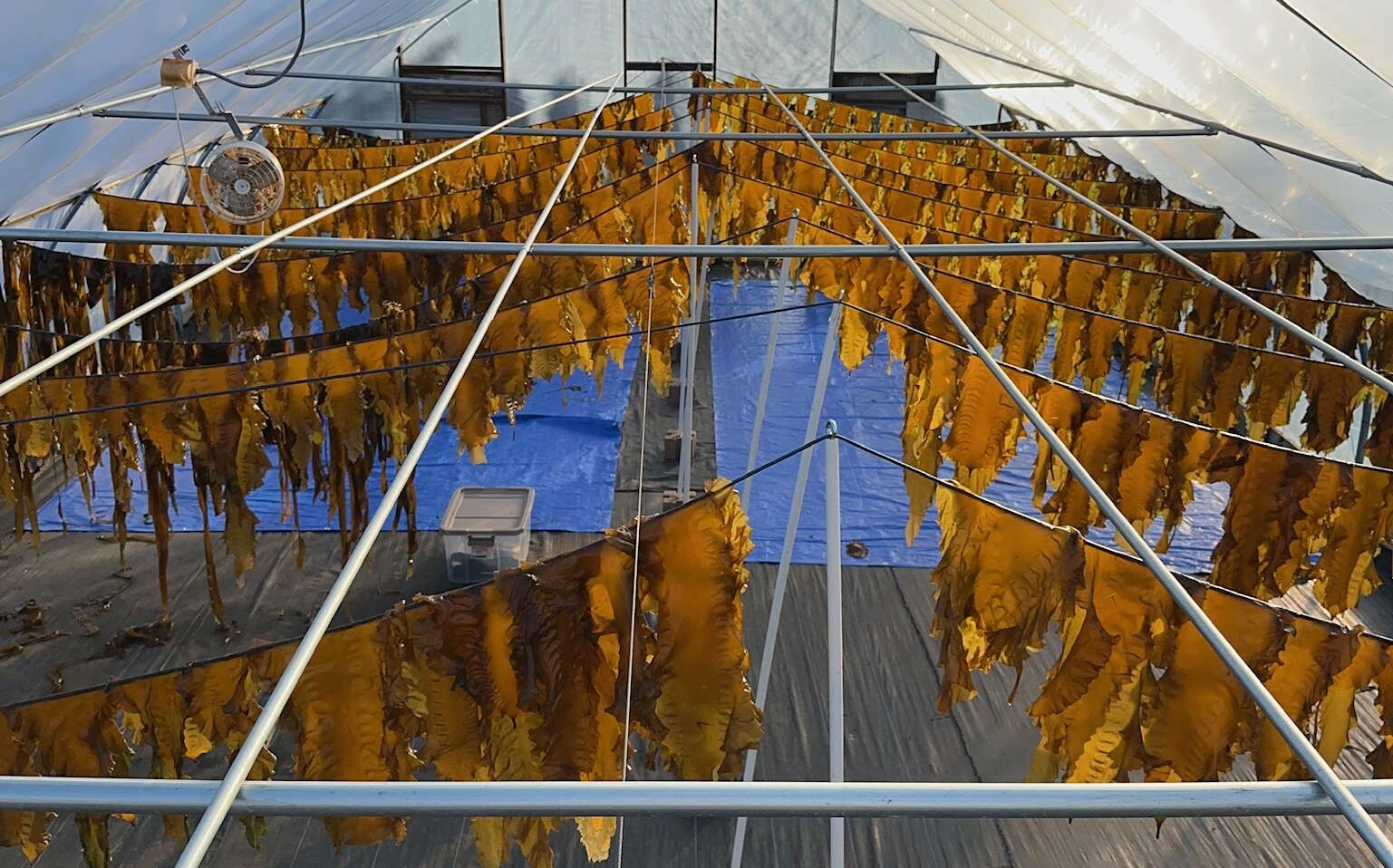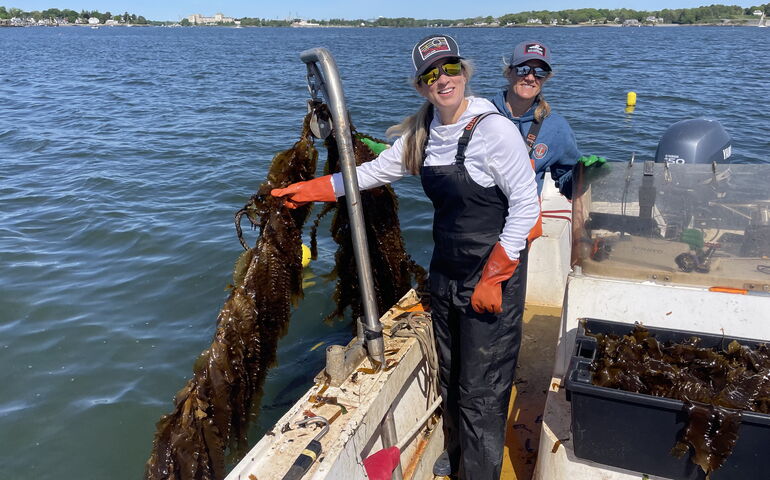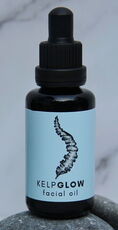
Kittery startup expands R&D on kelp extract for use in skin care products
 Photo / Courtesy, Cold Current Kelp
Krista Rosen, left, and Inga Potter started Cold Current Kelp to grow sugar kelp and extract beneficial bioactive compounds for skin care.
Photo / Courtesy, Cold Current Kelp
Krista Rosen, left, and Inga Potter started Cold Current Kelp to grow sugar kelp and extract beneficial bioactive compounds for skin care.
Another startup sees farmed kelp as a market opportunity — this time for use in skin care.
Cold Current Kelp in Kittery grows kelp, extracts compounds from the seaweed and makes the a variety of skin products. The company was awarded a $175,000 research and development grant and is getting ready to move into a 1,059-square-foot lease at 37 Route 236 to begin manufacturing there.
The startup is building on a growing industry propelled by Atlantic Sea Farms, a seaweed farming company in Biddeford that has “partner farmers” and makes value-added food products for a growing number of retail outlets across the nation.
And earlier this year, 15 aquaculture and fisheries experts from Maine traveled to Japan to study that nation’s wild and farm-raised kelp industry.
The industry in the U.S. is relatively young. But Maine represents the majority of farmed seaweed in the nation.
Cold Current Kelp’s founders, Krista Rosen and Inga Potter, are seeing additional opportunities for nonfood uses. After launching the business in 2021, the two were recently awarded a Small Business Innovation Research grant through the U.S. Department of Agriculture.
“Our analysis of the bioactive compounds of kelp extract has the potential to further establish kelp’s credibility as a sustainable, effective, nontoxic ingredient for the natural skin care sector, where consumer demand is strong and growing,” said Rosen.
Bootstrap start
Rosen has a background in securities litigation, in New York City and Maine, and served on the board of Laudholm Trust, supporting the Wells National Estuarine Research Reserve for six years. That led to her interest in ocean farming and the blue economy.
Potter is a marine biologist and educator who earned a Ph.D. from the University of New Hampshire in 2010 studying the ecology of large oceanic fish. Potter said that she has collaborated with scientists all over the world in her research, and that her environmental science background drew her to the potential of kelp farming.
They work with Bob Leipold, Rosen’s uncle and a chemical engineer with professional experience in the chemical industry, biotechnology and pharmaceutical consulting.
They said they view kelp as a sustainable crop that improves ocean health by naturally purifying the water, and an environmentally friendly source of plant-based bioactive compounds used in skin care.

The idea to start a small kelp farm off the Maine coast germinated several years ago. While studying potential uses of the seaweed, they experimented with making a skin care product for themselves.
“We really liked it,” said Rosen.
They sent it to friends who, they said, also enjoyed using it.
To make the skin care product, they experiment with a “nontoxic green chemistry” method to extract what they said are beneficial compounds in the kelp, said Rosen.
The extraction to date has been “low tech.” The grant money will fund a more “high-tech green chemistry” method of extraction. Both methods are nontoxic. Rosen and Potter declined to elaborate on how the methods work.
The extract is blended with organic oils “that are also known to be great for your skin,” said Potter.
As a bootstrap company, they operated at Rosen’s home up to now and also have a separate greenhouse to dry the harvested kelp.
They have two 400-square-foot farms permitted by the Maine Department of Marine Resources. As the company grows, the goal is to buy kelp from other farmers.
“We’d like to eventually create a new market and new demand for the high-value use of kelp and incentivize other folks to grow it,” said Potter.
‘Green’ extraction
The product is sold direct-to-consumers through the company’s website and it’s in about 20 stores, mostly in New England. Potter and Rosen said they’re speaking with hotels and spas. The founders declined to share production and distribution numbers.
The two-year lease at 37 Route 236 is an opportunity to expand production, they said.

They said the USDA grant would go toward research on the feasibility of using a relatively novel green extraction method to obtain bioactive compounds from Maine-grown sugar kelp.
The project will examine the effects of a variety of extraction conditions as well as the age of kelp at harvest. It will identify, characterize and quantify resulting compounds of interest.
The proposed extraction will not use toxic solvents and is expected to result in higher extraction yields in less time, according to a news release.
Kelp is harvested in the spring, when its long, ruffled blades have reached up to 10 feet in length. The kelp is harvested by hand, cutting it off the line and placing it into totes. Once harvested, it’s loaded onto a truck and transported to the nearby greenhouse.
In the greenhouse, the kelp is hung on lines to stabilize and preserve its bioactive compounds. As it dries, sugar kelp changes from deep brown to green while losing about 90% of its weight. The change takes place within 24 hours if the weather is warm and dry.
Extraction of the compounds is conducted by an out-of-state company. The extract then goes to a separate agricultural research service for chemical analysis of the compounds.
“The goal is to create an extract that gets the maximum potential of these bioactive compounds,” said Potter.
The project could be a step toward producing natural, nontoxic ingredients with quantifiable bioactive compounds that can be used by the company to create effective skin care products, according to the release.
“As a regenerative, renewable crop that restores ocean health, kelp offers many benefits to our environment and economy, and this research will allow us to expand its use as a sustainable alternative to ingredients in other industries,” said Potter.













0 Comments